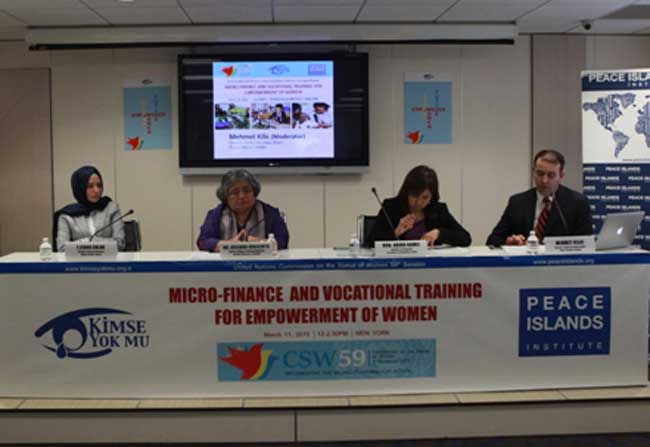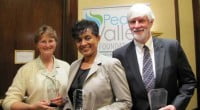Micro-Finance and Vocational Training for Empowerment of Women

Date posted: March 31, 2015
Peace Islands Institute and Kimse Yok Mu held a panel discussion on “Micro-Finance and Vocational Training For Empowerment of Women” on the occasion of the 59th Session of the United Nations Commission on the Status of Women. Mehmet Kilic, Director of Peace Islands Institute’s Center for Global Affairs, served as moderator for a panel of speakers from diverse backgrounds and experience in humanitarian relief, pharmaceutical, and politics. The panel featured Ms. F. Zehra Colak, member of external relations of Kimse Yok Mu, Turkey, Dr. Krisana Kraisintu, Rector of College of Oriental Medicine of Rangsit University in Thailand, and the Honorary Kamei Akiko, former Member of Parliament of The House of Councillors of Japan. The panelists each drew from their backgrounds to discuss the importance of public-private partnerships, networking, knowledge-transfers, social media, and holistic approach in micro-finance and vocational training. Presentations were then followed by a dynamic Q&A session that explored how best practices and successful projects in the developing regions of the world could be adopted by developed countries (contrary to the usual developed country to developing country adaptation), challenges to micro-finance in markets dominated by multinational corporations,
Ms. Colak provided an overview of the portfolio of micro-finance and vocational training projects undertaken by Kimse Yok Mu and discussed the effects of clean water, natural disasters, conflicts and medical services as it relates to women empowerment. She also introduced her organization’s new program, “Design for Good” that leverages social media to spread goodness to the people. The program involves 60 volunteers from various professions and provides a platform for women to market and profit from their handicrafts.
Dr. Kraisintu shared a video that outlined her work in the southern provinces of Thailand. She emphasized the importance of a holistic approach to economic empowerment of women in both microfinance and vocational training. Drawing from her experience in program development and implementation in various developing regions of the world, she highlights the understanding of the market as well as networking as crucial groundwork and key determinants that premediates a successful program.
Ms. Akiko gave an overview of the global development assistance agenda of the Japanese government and projects and activities executed through the federal agency, Japanese International Cooperation Agency. She also shared insights on women issues and inherent cultural gender norms drawn from her experience working with her constituents as a member of parliament. Ms. Kamei also described a handicraft project introduced in the tsunami-affected area in Japan to empower women, shining light to how women empowerment activities can be introduced to developed countries of the world.
Source: Peace Islands Institute , March 11, 2015
Tags: Hizmet and business | North America | USA | Women issues |



























